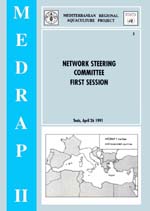
Tunis, April 26 1991
MEDRAP II
RAB/89/005-RER/87/009
FIELD DOCUMENT
91/3
 | NETWORK STEERING COMMITTEE FIRST SESSION Tunis, April 26 1991 |
Edited by MEDRAP II Regional Center
Tunis - Tunisia
All rights reserved. No part of this publication may be reproduced, stored in a retrieval system, or transmitted in any form or by any means, electronic, mechanical, photocopying or otherwise, without the prior permission of the copyright owner. Applications for such permission, with a statement of the purpose and extent of the reproduction, should be addressed to the Director, Publications Division, Food and Agriculture Organisation of the United Nations, Viale delle Terme di Caracalla, 00100 Rome, Italy.
Preparation of this Document
This document is one of a series of documents prepared during the course of the Project identified in the title page. The conclusions and recommendations given were considered appropriate at the time it was prepared. They may be modified in the light of further knowledge gained at subsequent stages of the Project.
The designations employed and the presentation of the material in this document do not imply the expression of any opinion whatsoever on the part of the Food and Agriculture Organisation of the United Nations concerning the legal status of any country, territory, city or area or of its authorities, or concerning the delimitation of its frontiers or boundaries.
The opinions expressed by the Authors in this document are not necessarily those of FAO or the Governments of the participating countries.
Abstract
In Tunis, on April 26th, 1991, the Steering Committee held its first meeting to discuss the survey on capabilities and needs, then schedule of activities for 1991–1992, the Networking seminar recommendations, the Project document revision, the constitution of an Information Sub-Network and other items related to the project implementation.
The Aquaculture activities in the different countries participating in MEDRAP II have shown good standing progress which might have resulted from both Phase I of MEDRAP and from the interest of participating countries in aquaculture development. As the conducted survey on the capabilities and needs was incompleted, the countries were requested to send the data because of its very high importance in the implementation of the Project's activities.
The presented schedule of activities for 1991–1992 was discussed and adopted. In view of limited funds, it was mentioned that it is desirable to concentrate on marine aquaculture as a first priority. France, as the only associated country present, agreed to host and bear the costs of four activities and to provide a consultant for a period of 7 to 8 man-months.
While reviewing the Networking seminar recommendations, it was agreed to constitute in each respective country a national committee, representative of the various interested institutions and individuals, and under the chairmanship of the National coordinator in order to ensure the efficient and effective operation and the continuity of MEDRAP II.
The recommendations and the work plan adopted imply a budgetary reallocation which would br carried out by the Project Coordinator in collaboration with FAO and UNDP. This reallocation will be updated whenever necessary.
All the participants insisted on the necessity of introducing an Information sub-network and giving it a high priority see its importance in the development of all the other sub-networks.
Acknowledgements
The Editor would like to thank all the Tunisian authorities, namely the «Commissariat Général à pêche» and at their Mr. S. Haj Ali, the National coordinator, for the remarkable help and assistance in the organisation of the meeting.
The Editor would also like to thank UNDP and FAO Representatives for their assistance and participation to better define the project's structure, procedure and rules.
Thanks are also adressed to all the National and Sub-regional Coordinators for their active participation and contribution.
Note from the reviser
The revision and publication of this document could only be done a long time after the closure of the project. This has led to some difficulties in finalising the documents and implementing corrections, because authors and contributors as well as some of the original material or files were no longer available.
Therefore contributions from participants and session papers annexed to most of the documents were left in their original form. No language corrections were introduced, the content was not modified and left under their respective authors' responsibility.
Considering the above, we hope that the reader will understand that a standard of publication could not be maintained on a level as high as we would have liked it to be.
United Nations Development Programme

Food and Agriculture Organisation of the United Nations

Hyperlinks to non-FAO Internet sites do not imply any official endorsement of or responsibility for the opinions, ideas, data or products presented at these locations, or guarantee the validity of the information provided. The sole purpose of links to non-FAO sites is to indicate further information available on related topics.
This electronic document has been scanned using optical character recognition (OCR) software. FAO declines all responsibility for any discrepancies that may exist between the present document and its original printed version.
1 - Introductory presentation.
1 - Survey of aquaculture capabilities and needs.
2 - Schedule of activities for 1991 – 1992.
3 - Activities with associated countries.
4 - Networking seminar recommendations.
(b). Project Document revision.
(d). Presence of the Sub-regional Coordinators in the Steering Committee meeting.
(f). Monitoring and follow up of the project.
(g). Procedures and facilities for the Project Coordinator.
(h). United Nations' Volunteers.
(i). Funding activities in European countries.
(j). Recommendations for the next Steering Committee meeting.
3 - Next Steering Committee meeting.
1 - Survey of aquaculture capabilities and needs in member countries.
2 - Adopted schedule of activities for 1991 – 1992.
3 - Networking seminar recommendations.